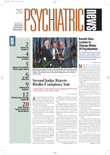Growing up as an only child—at least for males—may be a predisposing factor for committing violent crimes later in life, according to a study in the June American Journal of Psychiatry.
Back in 1999, a study suggested that peer rejection during childhood is the strongest predictor of adolescent antisocial behavior among males. So Liisa Kemppainen, M.D., a psychiatrist at the University of Oulu in Oulu, Finland, and her colleagues wondered: Might growing up as an only child, and thus quite possibly having an autocratic, less interactive personal style, put a youngster at risk for peer rejection, and might such rejection in turn lead to greater antisocial behavior, such as criminality, during adulthood? They then decided to test this hypothesis by determining whether they could link being an only child to criminality in adulthood.
“To our knowledge,” they wrote, “epidemiological examination of an association between being an only child and committing a registered crime based on a large database has never been performed.”
They included in their study 5,587 male subjects who had been born in northern Finland during 1966 and for whom they had substantial data about their childhoods, such as whether they had been only children or had had siblings, or whether they had experienced certain perinatal, maternal, or paternal events that might also predispose them to adult criminality, such as a premature birth, a low birth weight, a mother smoking during pregnancy, a mother not wanting a pregnancy, or a father being absent during childhood.
They then examined the Finnish crime registry to see which of these 5,587 subjects had committed crimes between the ages of 15 and 32, and then attempted to determine whether they might be able to link being an only child to later crime.
They could. Out of the 5,587 subjects, 4,984 had grown up with siblings, and 257 had been only children. Sixteen (6.2 percent) of the 257 subjects who had been only children subsequently committed a violent crime, whereas only 177 of the 4,984 subjects who had had siblings (3.6 percent) did so. In other words, “being an only child increased the crude odds ratio for committing a violent crime later in life relative to not being an only child up to 1.8-fold,” the researchers reported.
Moreover, the investigators found that being an only child combined with perinatal risk factors increased the odds of committing a violent crime fourfold. What’s more, if maternal risks were present along with being an only child, the odds of committing a violent crime increased sixfold. And if paternal risks were present along with being an only child, the odds of committing a violent crime increased eightfold.
“Interestingly, paternal absence was the strongest risk factor when combined with growing up without siblings,” the researchers pointed out.
“The results support the hypothesis that growing up as an only child is associated with violent criminality among male subjects,” the investigators concluded.
